#automotive industries
Explore tagged Tumblr posts
Text
#ET Expo#& Automotive Electronics & Testing Show#automotive industries#Western_India#electronicsnews#technologynews
0 notes
Text
Driving the Future: AI's Impact on Electric Vehicles & Consumer Adoption with Matt Britton
In the rapidly evolving landscape of technology and automotive industries, the role of Artificial Intelligence (AI) in shaping consumer adoption of electric vehicles (EVs) is becoming increasingly pivotal. As businesses and consumers alike seek deeper understanding of this intersection, the need for insights from proven experts in the field is at an all-time high. One such expert who stands out in delivering impactful discourse on this topic is Matt Britton, a renowned AI keynote speaker and the founder and CEO of Suzy, a consumer intelligence platform.
Matt Britton has carved a niche for himself not only as a visionary in consumer trends but also as a trusted advisor to over half of the Fortune 500 companies. His expertise is further evidenced by his bestselling book "YouthNation," which positions him as a leading authority on emerging trends among younger demographics, including Generation Z—key adopters of new technologies such as electric vehicles.
The Intersection of AI and Electric Vehicles: A Keynote Topic
When considering a keynote speech on "AI's Role in Electric Vehicles and Consumer Adoption," Matt Britton is uniquely poised to offer enlightening perspectives that combine his deep understanding of AI, consumer trends, and the automotive industry. This topic, rich in innovation and relevance, is perfectly suited for top conference speakers like Matt, who can articulate complex relationships between technology and consumer behavior in an engaging manner.
Why Matt Britton?
Expertise in AI and Consumer Trends: As an AI expert speaker, Matt brings a wealth of knowledge about how artificial intelligence is transforming industries. His insights into AI’s implications for electric vehicles—from autonomous driving features to predictive maintenance and personalized in-car experiences—are critical for businesses looking to leverage AI for competitive advantage.
Proven Track Record with Fortune 500 Companies: Matt's extensive experience consulting for major corporations gives him a pragmatic understanding of how large-scale organizations can adapt to technological shifts. His ability to translate these insights into strategic advice is invaluable for any audience looking to understand the future of electric vehicles and AI.
Engagement with Generation Z: Matt’s recognition as one of the top Generation Z experts allows him to shed light on how this demographic's preferences and behaviors are shaping the future of transportation. Since younger consumers are more likely to prioritize sustainability and are enthusiastic adopters of technology, their influence on the EV market is significant.
Structuring the Keynote on AI's Role in EVs and Consumer Adoption
Introduction to AI in the Automotive Industry: A brief overview of how AI is currently being integrated into the automotive sector, setting the stage for a deeper exploration of its impact on electric vehicles specifically.
Core AI Technologies Driving EV Innovation: Discussion of specific AI technologies—such as machine learning algorithms, neural networks, and natural language processing—and their applications in electric vehicles. This could include advancements in battery technology through AI-driven research, enhanced safety features, and AI-based user interfaces.
Consumer Adoption of Electric Vehicles: Analysis of current consumer trends in the adoption of electric vehicles, supported by data and insights from Suzy’s platform. This section would explore barriers to adoption, such as range anxiety and cost, and how AI can address these concerns.
The Future Outlook: Predictions for the future interaction between AI and electric vehicles, considering emerging technologies and shifting consumer expectations. This part of the keynote would be forward-thinking, drawing on Matt’s expertise in forecasting consumer trends.
Q&A: A session where Matt can engage directly with the audience, answering questions and expanding on topics covered in his speech, providing additional value and interaction.
Conclusion
Choosing a speaker like Matt Britton for a keynote on “AI's Role in Electric Vehicles and Consumer Adoption” offers more than just an informative session; it promises a thought-provoking and strategic exploration of one of today’s most dynamic technological frontiers. His dual focus on AI and consumer behavior, backed by his authoritative experience with major corporations and insights into young consumers, makes him one of the top keynote speakers for conferences focusing on innovation, technology, and automotive industries. Engaging Matt for your next event could not only enlighten your audience but also inspire them to embrace the transformative power of AI in the electric vehicle sector.
0 notes
Text
Fuel Cell Generator Market Is Driven by Minimalization of Carbon Residues
The size of the fuel cell generator market was USD 330 million in 2022, and the figure is set to rise at a CAGR of 17.50% from 2022 to 2030 and reach USD 1,199 million by the end of this decade.
There are several reasons for this development, including the minimalization of CO2 emissions, the easy availability of fuel cells, and their ability to renew energy. The snowballing need for the production of clean power along with minimal releases from CO2 will drive the market.

Numerous regions and nations throughout the globe are targeting to decrease overall releases of CO2 to zero by 2050, To achieve CO2 neutrality. The government's focus has amplified on making a decarbonized civilization in the past few years. To achieve this aim, the introduction of renewable sources, including solar, biomass, hydro, wind, and geothermal, is vital.
The production of electricity with the support of solar and wind has a few drawbacks, like the lack of ability to regulate the generation and huge quantity of output disparities reliant on weather conditions.
Aquaculture is the fastest-rising end-user developing at a CAGR of approximately 19.2%, credited to the increasing quantity of aquaculture amenities and increasing ecological impacts related to it such as the consumption of electricity and water. Mainly to lessen the environmental effects, governments have taken numerous steps to utilize fuel cell-based generators as an alternative to diesel generators.
North America is dominating the fuel cell generator market and is projected to continue with this dominance throughout the decade. This can be ascribed to the growing concentration and fast acceptance of clean sources.
In North America, the U.S. is leading the market, and it will develop with a CAGR of 18.1%, credited to solid economic support. The innovative growth in the usage of renewable sources and snowballing electricity needs from the aquaculture and data centers industry are the major reasons that will boost the industry in the future as well.
Hence, the minimalization of CO2 emissions, the easy availability of fuel cells, and their ability to renew energy are the major factors contributing to the growth of the fuel cell generator market.
#Fuel Cell Generator Market#Market Trends#Fuel Cell Technologies#Clean Power Generation#Backup Power Systems#Mobile Applications#Market Dynamics#Key Players#Emerging Opportunities#Energy Solutions#Telecommunications#Automotive Industries#Sustainability#Resilience#Decentralized Power Generation
0 notes
Text
What The Role of Desiccants in the Automotive Industry Experts Want You to Know
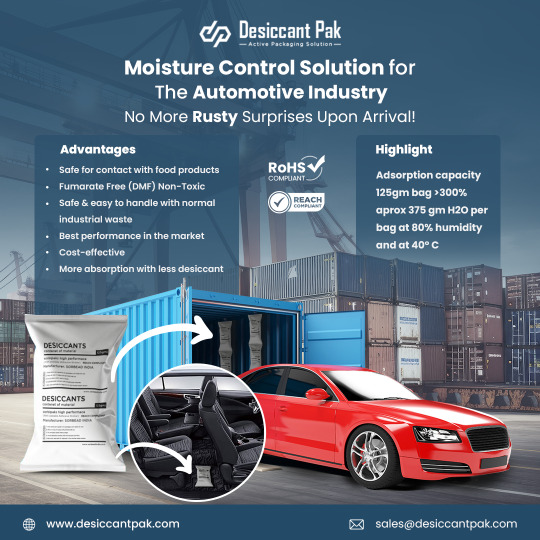
The part of Desiccants in the Automotive Assiduity preface In the fast- paced and dynamic world of the automotive assiduity, perfection and trustability are consummate. Manufacturers and suppliers strive to insure that every element performs at its stylish, and this includes keeping humidity and moisture at bay. In this regard, desiccants play a pivotal part in maintaining the integrity of automotive products. In this comprehensive composition, we will claw into the significance of desiccants in the automotive assiduity and their colorful operations, showcasing their significance in enhancing product quality and life.
1. What is Desiccants ?
Desiccants are hygroscopic substances able of absorbing and retaining humidity from the girding terrain. They work by creating a dry terrain within a sealed space, effectively precluding the build up of condensation and moistness. In the automotive assiduity, desiccants are primarily used to cover sensitive factors and accoutrements from humidity damage during manufacturing, shipping, and storehouse.
2. Why Desiccants used in Automotive industries?
During the manufacturing process of automotive factors, exposure to humidity can lead to erosion, declination, and indeed complete failure of corridor. To help similar issues, desiccants are integrated into the product line. From the manufacturing of electronic control units( ECUs) to airbag modules and optic detectors, desiccants are strategically placed to insure optimal performance and tractability.
3. Desiccants used in Automotive Storage & Shipping
The trip of automotive corridor from the manufacturer to the assembly line involves colorful stages of transportation and warehousing. These stages can subdue the factors to varying temperature and moisture conditions. Desiccants are incorporated into packaging accoutrements to guard the products from humidity- related damages during conveyance and storehouse. By barring humidity, desiccants help maintain the original quality of the factors until they're ready for installation.
4 Several types of Desiccants for in the Automotive Industry
Several types of desiccants find operations in the automotive sector. Each type possesses distinct characteristics suited for specific conditions. Some generally used desiccants include
Silica Gel Silica gel is one of the most extensively used desiccants in the automotive assiduity. Its high face area and excellent humidityabsorbing capacity make it an ideal choice for guarding sensitive electronic factors.
Molecular Sieve Molecular sieve desiccants are preferred for operations where exceptionally low moisture situations are needed. They're generally used in air exertion systems and energy tanks to maintain dry conditions.
Clay Desiccants Clay desiccants are provident and effective for humidity immersion. They're generally used for guarding larger automotive factors during shipping and storehouse.
Calcium Chloride Desiccants These desiccants have a high humidity immersion rate and are ideal for diving extreme moisture conditions during conveyance.
5. Impact on Automotive Performance
The use of desiccants in the automotive assiduity has a direct impact on product performance and overall quality. Then is how desiccants contribute to enhancing automotive performance Enhanced Electrical Performance humidity can compromise the electrical integrity of colorful automotive factors, leading to malfunctions or failure. Desiccants insure that sensitive electronics, similar as ECUs, detectors, and infotainment systems, remain dry and function optimally. Increased Life By guarding automotive corridor from humidity- related damage, desiccants contribute to the extended lifetime of factors. This leads to advanced client satisfaction and reduces the need for frequent reserves. Improved Safety In critical safety factors like airbag modules, any humidity intrusion could lead to malfunction during deployment. Desiccants guarantee that these safety features remain in perfect condition, furnishing dependable protection to passengers.
6. Environmental Impact piecemeal from their performance benefits,
Desiccants also play a part in reducing the environmental impact of the automotive assiduity. By conserving the quality of factors, desiccants help help unseasonable failures, reducing the overall waste generated. also, desiccants themselves can frequently be disposed of in aneco-friendly manner. 7. unborn Trends As the automotive assiduity continues to evolve, so will the use of desiccants. inventions in desiccant technology will lead to more effective and sustainable results for humidity control. Manufacturers will concentrate on integrating smarter humidity operation systems to meet the adding demands of the assiduity.
Conclusion
Desiccants are obscure icons in the automotive assiduity, quietly icing that critical factors perform at their stylish. From guarding electronic systems to conserving safety features, their impact on product quality and life can not be exaggerated. As the automotive assiduity embraces advancements in humidity control, desiccants will remain necessary for achieving peak performance and client satisfaction.
#humiditycontrol#moistureabsorbers#shipping#desiccantsilicagel#packagingsolutions#automotive#cargo transport#cargo shipping#self care#desiccant#Automotive industries#electronic systems#Clay Desiccants#automotive products
0 notes
Text

#classic car#classic cars#car photo#cars#vintage cars#automobile#automotive#auto#car#car rental#car and driver#car porn#car industry#classic design#classic aesthetic#aesthetic
1K notes
·
View notes
Photo
Noted industrial designer Walter Dorwin Teague was asked by Automotive Industries magazine in the spring of 1936 what kind of car he drove:
"Oh," he said, "a 1934 Ford," which didn't seem to interest anybody much until he added, "You know, that was the last decent exterior design of an American car..." Several other designers...were inclined to agree with the speaker.
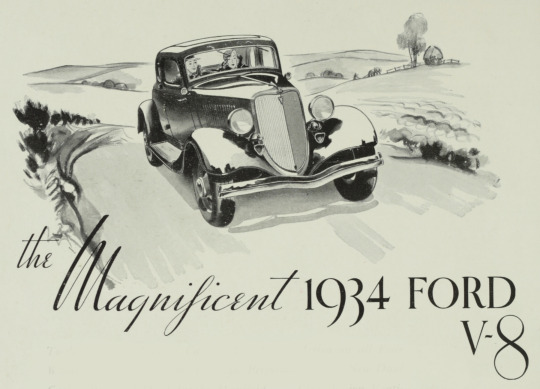
The Magnificent 1934 Ford V-8, The Home, July 2nd, 1934
#Walter Dorwin Teague#1934 Ford#1930s#industrial design#art deco#streamline moderne#1936#Automotive Industries
26 notes
·
View notes
Text

if you can’t identify what i’m thinking about at any given moment there’s a nonzero chance it’s train systems
373 notes
·
View notes
Photo
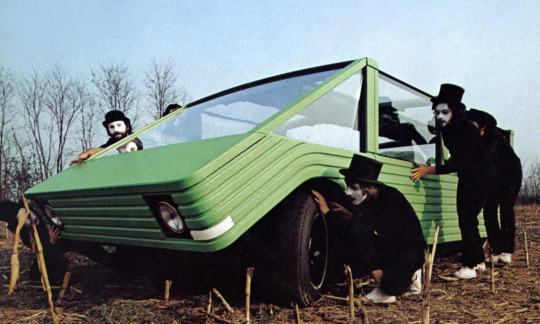
Wheels of freedom: Citroën Kar-A-Sutra, a futuristic vision of automotive design ➤
94 notes
·
View notes
Text

Vertical parking garage in Chicago. [1936]
#architecture#automotive#film photography#analog#urban#chicago#industrial#black and white#monochrome#30s#photography#u
97 notes
·
View notes
Text
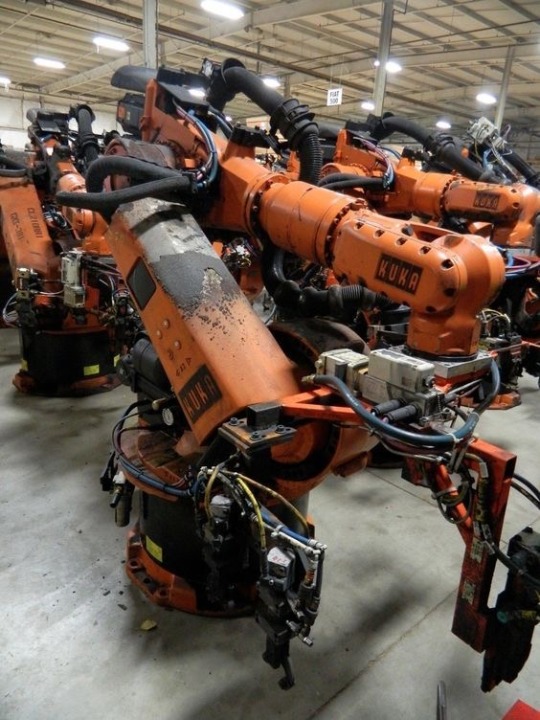
industrial robots
#KUKA#robot#industrial robot#manufacturing#heavy industry#automotive#FIAT#Italy#Torino#Turin#FIAT 500
212 notes
·
View notes
Text
Umbrellas and automobiles are different. Not just because of size, function, and cost. But for a reason we seldom stop to consider. A person can use an umbrella without buying another product. An automobile, by contrast, is useless without fuel, oil, repair services, spare parts, not to mention streets and roads. The humble umbrella, therefore, is a rugged individual, so to speak, delivering value to its user irrespective of any other product. The mighty auto, by contrast, is a team player completely dependent on other products. So is a razor blade, a tape recorder, a refrigerator, and thousands of other products that work only when combined with others. The television set would stare blankly into the living room if someone somewhere were not transmitting images to it. Even the lowly closet hanger presupposes a rack or bar to hang it on. Each of these is part of a product system. It is precisely their systemic nature that is their main source of economic value. And just as "team players" must play by certain agreed-on rules, systemic products need standards to work. A three-pronged electrical plug doesn't help much if all the wall sockets have only two slots. This distinction between stand-alone and systemic products throws revealing light on an issue that is widening today's information wars all around the world. The French call it la guerre des normes—“the war over standards." Battles over standards are raging in industries as diverse as medical technology, industrial pressure vessels, and cameras.
Alvin Toffler, Powershift: Knowledge, Wealth, and Power at the Edge of the 21st Century
#quote#Alvin Toffler#Toffler#power#powershift#technology#standards#automotive#umbrellas#systems#products#product design#industry#cars
248 notes
·
View notes
Note
General Lee, KITT, the DeLorean, or Christine, which would each of you own?



(( Why Christine, sweet Jesus, you could have put there, Idk, HERBIE, that's way more child friendly lol ))
#courtier automotive and others#Paw Patrol#Zuma#Marshall#Rocky#Paw Patrol Zuma#Paw Patrol Marshall#Paw Patrol Rocky#Dukes of Hazzard#General Lee#Knight Rider#KITT#KI2T#KI3T#Knight Industries Two Thousand#Knight Industries Three Thousand#Back To The Future#DeLorean#Christine Plymouth Fury#Herbie The Love Bug#Herbie Fully Loaded#Herbie
40 notes
·
View notes
Text

Illustration detail from the General Motors’ automotive design instructional booklet, Modes and Motors - 1938.
#vintage illustration#vintage brochures#industrial design#design#automotive design#art deco#automobile design#motor car design#gm#general motors#the 30s#the 1930s#30s design#30s style#30s cars#vintage cars#vintage automobiles
31 notes
·
View notes
Photo
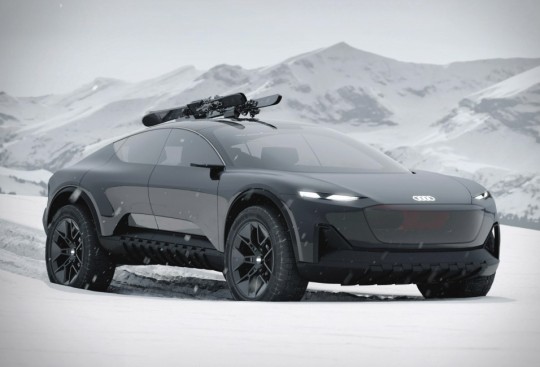



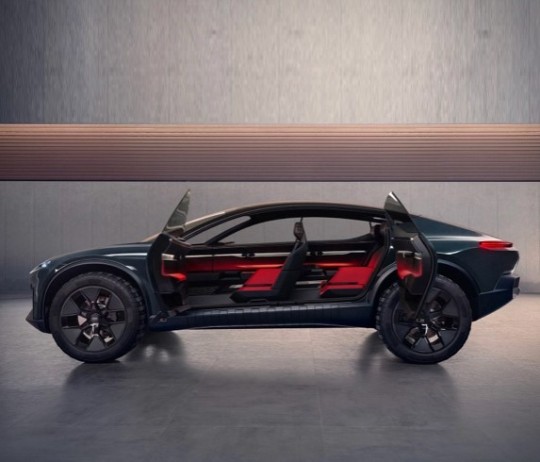
audi activesphere concept
356 notes
·
View notes
Text

#mercedes#classic cars#classic car#old cars#old car#vintage cars#automobiles#automotive#auto#automobile#car photo#cars#car photography#luxury car#expensive#rich life#luxury aesthetic#luxurious#luxury#car industry#car interior detailing#vintage aesthetic
114 notes
·
View notes
Text
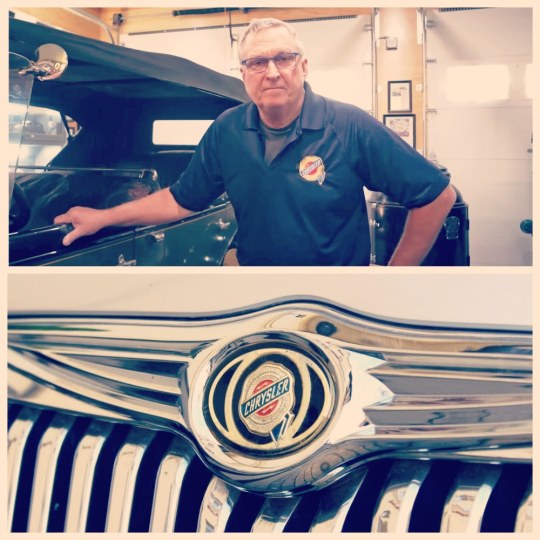
🇺🇸 As we approach Chrysler's 100th anniversary, Frank B. Rhodes Jr., great-grandson of company founder Walter P. Chrysler, is raising concerns about the brand’s future and wants to take action to rescue it. In a recent open letter to “investors and workers,” Rhodes announced his plan to revitalize Chrysler and its related brands—Dodge, Ram, and Jeep—under new “American” ownership.
🚗 Stellantis, the current parent company of Chrysler, has come under criticism from Rhodes for its management of the brand, which he claims has been severely neglected. The Chrysler brand currently offers only one vehicle, the Pacifica minivan, while several promising concept cars, such as the Chrysler Airflow, were shelved before reaching production. Rhodes highlighted Stellantis’ focus on European brands like Citroën and Peugeot, arguing that Chrysler has been left behind.
💼 Rhodes, who has been a Chrysler ambassador for over 40 years, points to his family’s legacy and his own ownership of the final Chrysler 300C as reasons for his dedication to the brand. He submitted a 17-page proposal to Stellantis executives, inviting them to a confidential discussion on reviving Chrysler. His plan includes giving equity stakes to employees, echoing the worker-centered vision of his great-grandfather, who founded the company on principles of American ingenuity and innovation.
📉 Rhodes also expresses concern about the future of Dodge, which has focused heavily on electric vehicles (EVs) despite its core customer base being more interested in American muscle and performance cars. He argues that Stellantis’ push toward an all-electric lineup by 2028 for Chrysler is out of step with market trends, where hybrids are gaining popularity. The all-electric path, Rhodes warns, could be disastrous for the brand’s future.
🔧 Despite these challenges, Rhodes remains optimistic about the potential to rebuild Chrysler as a symbol of blue-collar luxury and innovation. He is calling for a return to American-designed and built products, and greater autonomy for Chrysler and Dodge within Stellantis. Rhodes’ ultimate goal is to rescue the brand from what he sees as poor management and ensure that Chrysler survives to celebrate its next century.
🚨 As Chrysler fans prepare for the 100th anniversary celebrations next summer, including a large event in Pennsylvania, Rhodes is urging action to prevent the brand from fading into obscurity. Without intervention, he warns, Chrysler’s future looks bleak.
#transatlantic torque#brits and yanks on wheels#companies#technology#brands#engineering#cars#tech#old cars#innovation#business and industry sectors#history#chrysler#dodge#Plymouth#walter chrysler#detroit#michigan#big three#Chrysler Motors#automotive#american auto#automobile#classic cars#car#made in usa#stellantis#fiat chrysler automobiles#american company#american car
10 notes
·
View notes